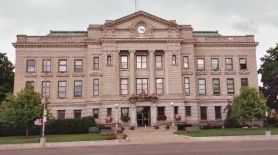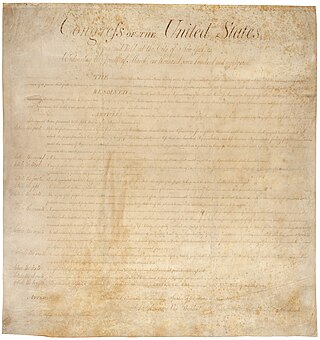
The First Amendment to the United States Constitution prevents the government from making laws that regulate an establishment of religion, or that prohibit the free exercise of religion, or abridge the freedom of speech, the freedom of the press, the freedom of assembly, or the right to petition the government for redress of grievances. It was adopted on December 15, 1791, as one of the ten amendments that constitute the Bill of Rights.
McDonald's Corporation v Steel & Morris[1997] EWHC 366 (QB), known as "the McLibel case", was an English lawsuit for libel filed by McDonald's Corporation against environmental activists Helen Steel and David Morris over a factsheet critical of the company. Each of two hearings in English courts found some of the leaflet's contested claims to be libellous and others to be true.
The Slaughter-House Cases, 83 U.S. 36 (1873), was a landmark U.S. Supreme Court decision consolidating several cases that held that the Privileges or Immunities Clause of the Fourteenth Amendment to the U.S. Constitution only protects the legal rights that are associated with federal U.S. citizenship, not those that pertain to state citizenship. Though the decision in the Slaughter-House Cases minimized the impact of the Privileges or Immunities Clause on state law, the Supreme Court would later incorporate the Bill of Rights to strike down state laws on the basis of other clauses. In 2010, the Court rejected arguments in McDonald v. Chicago to overrule the established precedent of Slaughterhouse and decided instead to incorporate the Second Amendment via the Due Process Clause of the Fourteenth Amendment.
Substantive due process is a principle in United States constitutional law that allows courts to establish and protect certain fundamental rights from government interference, even if they are unenumerated elsewhere in the U.S. Constitution. Courts have asserted that such protections come from the due process clauses of the Fifth and Fourteenth amendments to the U.S. Constitution, which prohibit the federal and state governments, respectively, from depriving any person of "life, liberty, or property, without due process of law". Substantive due process demarks the line between those acts that courts hold to be subject to government regulation or legislation and those that courts place beyond the reach of governmental interference. Whether the Fifth or Fourteenth Amendments were intended to serve that function continues to be a matter of scholarly as well as judicial discussion and dissent. In recent opinions, Justice Clarence Thomas has called on the Supreme Court to reconsider all of its rulings that were based on substantive due process.

Stump v. Sparkman, 435 U.S. 349 (1978), is the leading United States Supreme Court decision on judicial immunity. It involved an Indiana judge who was sued by a young woman who had been sterilized without her knowledge as a minor in accordance with the judge's order. The Supreme Court held that the judge was immune from being sued for issuing the order because it was issued as a judicial function. The case has been called one of the most controversial in recent Supreme Court history.
In United States constitutional law, incorporation is the doctrine by which portions of the Bill of Rights have been made applicable to the states. When the Bill of Rights was ratified, the courts held that its protections extended only to the actions of the federal government and that the Bill of Rights did not place limitations on the authority of the state and local governments. However, the post–Civil War era, beginning in 1865 with the Thirteenth Amendment, which declared the abolition of slavery, gave rise to the incorporation of other amendments, applying more rights to the states and people over time. Gradually, various portions of the Bill of Rights have been held to be applicable to state and local governments by incorporation into the Due Process Clause of the Fourteenth Amendment of 1868.
Barrett v. Rosenthal, 40 Cal.4th 33 (2006), was a California Supreme Court case concerning online defamation. The case resolved a defamation claim brought by Stephen Barrett, Terry Polevoy, and attorney Christopher Grell against Ilena Rosenthal and several others. Barrett and others alleged that the defendants had republished libelous information about them on the internet. In a unanimous decision, the court held that Rosenthal was a "user of interactive computer services" and therefore immune from liability under Section 230 of the Communications Decency Act.
The Privileges or Immunities Clause is Amendment XIV, Section 1, Clause 2 of the United States Constitution. Along with the rest of the Fourteenth Amendment, this clause became part of the Constitution on July 9, 1868.
Troxel v. Granville, 530 U.S. 57 (2000), is a case in which the Supreme Court of the United States, citing a constitutional right of parents to direct the upbringing of their children, struck down a Washington law that allowed any third party to petition state courts for child visitation rights over parental objections.

In the United States, the right to petition is enumerated in the First Amendment to the United States Constitution, which specifically prohibits Congress from abridging "the right of the people peaceably to assemble, and to petition the Government for a redress of grievances".
Presser v. Illinois, 116 U.S. 252 (1886), was a landmark decision of the Supreme Court of the United States that held, "Unless restrained by their own constitutions, state legislatures may enact statutes to control and regulate all organizations, drilling, and parading of military bodies and associations except those which are authorized by the militia laws of the United States." It states that the Second Amendment to the United States Constitution limited only the power of Congress and the national government to control firearms, not that of the states, and that the right to peaceably assemble in the First Amendment to the United States Constitution was not protected by the clause referred to except to petition the government for a redress of grievances. This decision was overruled in McDonald v. City of Chicago in (2010).
Mitchell v. Forsyth, 472 U.S. 511 (1985), was a United States Supreme Court case deciding on the issue of immunity of cabinet officers from suits from individuals.
Modern libel and slander laws in many countries are originally descended from English defamation law. The history of defamation law in England is somewhat obscure; civil actions for damages seem to have been relatively frequent as far back as the Statute of Gloucester in the reign of Edward I (1272–1307). The law of libel emerged during the reign of James I (1603–1625) under Attorney General Edward Coke who started a series of libel prosecutions. Scholars frequently attribute strict English defamation law to James I's outlawing of duelling. From that time, both the criminal and civil remedies have been found in full operation.

In United States law, the federal government as well as state and tribal governments generally enjoy sovereign immunity, also known as governmental immunity, from lawsuits. Local governments in most jurisdictions enjoy immunity from some forms of suit, particularly in tort. The Foreign Sovereign Immunities Act provides foreign governments, including state-owned companies, with a related form of immunity—state immunity—that shields them from lawsuits except in relation to certain actions relating to commercial activity in the United States. The principle of sovereign immunity in US law was inherited from the English common law legal maxim rex non potest peccare, meaning "the king can do no wrong." In some situations, sovereign immunity may be waived by law.
McDonald v. City of Chicago, 561 U.S. 742 (2010), was a landmark decision of the Supreme Court of the United States that found that the right of an individual to "keep and bear arms", as protected under the Second Amendment, is incorporated by the Fourteenth Amendment and is thereby enforceable against the states. The decision cleared up the uncertainty left in the wake of District of Columbia v. Heller (2008) as to the scope of gun rights in regard to the states.
Estate of Thornton v. Caldor, Inc., 472 U.S. 703 (1985), was a United States Supreme Court case in which the Court held that a state statute providing employees with an absolute right not to work on their chosen Sabbath violates the Establishment Clause of the First Amendment.
California Motor Transport Co. v. Trucking Unlimited, 404 U.S. 508 (1972), was a landmark decision of the US Supreme Court involving the right to make petitions to the government. The right to petition is enshrined in the First Amendment to the United States Constitution as: "Congress shall make no law...abridging...the right of the people...to petition the Government for a redress of grievances." This case involved an accusation that one group of companies was using state and federal regulatory actions to eliminate competitors. The Supreme Court ruled that the right to petition is integral to the legal system but using lawful means to achieve unlawful restraint of trade is not protected.
United States v. Miller, 425 U.S. 435 (1976), was a United States Supreme Court that held that bank records are not subject to protection under the Fourth Amendment to the United States Constitution. The case, along with Smith v. Maryland, established the principle of the third-party doctrine in relation to privacy rights.
Franchise Tax Board of California v. Hyatt, 587 U.S. ___ (2019), was a United States Supreme Court case that determined that unless they consent, states have sovereign immunity from private suits filed against them in the courts of another state. The 5–4 decision overturned precedent set in a 1979 Supreme Court case, Nevada v. Hall. This was the third time that the litigants had presented their case to the Court, as the Court had already ruled on the issue in 2003 and 2016.
Plumhoff v. Rickard, 572 U.S. 765 (2014), is a United States Supreme Court case involving the use of force by police officers during high-speed car chases. After first holding that it had jurisdiction to hear the case, the Court held that the conduct of the police officers involved in the case did not violate the Fourth Amendment to the U.S. Constitution, which prohibits unreasonable searches and seizures.




